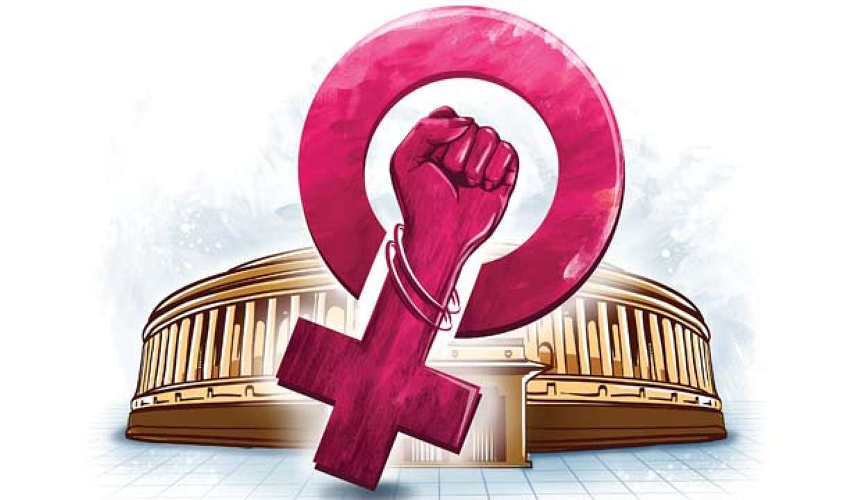Of the 543 MPs elected in the 16th Lok Sabha, 62 are women. This is the highest number of women MPs elected to the Lok Sabha in the history of the country.
Even with the highest number of women Members of Parliament ever in Indian history, the Women’s Reservation Bill, which aims to reserve 33% of seats in the Lok Sabha for women, continues to remain a distant dream as the 16th Lok Sabha enters its last monsoon session in July.
The 16th Lok Sabha will dissolve as the country will prepare to go for the general elections in early 2019.
Even as the Bharatiya Janata Party’s election manifesto in 2014 promised to work on the Women’s Reservation Bill or the Constitution (108th Amendment) Bill, 2008, the bill stands lapsed due to non-introduction in the Lok Sabha after being passed in the Rajya Sabha in March 2010.
Of the 543 MPs elected in the 16th Lok Sabha, 62 are women. This is the highest number of women MPs elected to the Lok Sabha in the history of the country, although by a small margin, as there were 58 women MPs elected to the 15th Lok Sabha in the 2009 general elections.
Bhawana Gawali, an MP from Yavatmal-Washim constituency in Maharashtra and member of Shiv Sena, which is the single largest ally of BJP with 18 seats in the Lok Sabha, said that BJP needs to bring parties on the same page first for the bill to be a success in Lok Sabha.
“Any single party will have to take this initiative and work hard on it continuously to make all the parties to sit together and talk. Since BJP is in power, it is expected to do so, but any other party can take this initiative. If there is no unanimous take outside the Parliament, it will not be of any use to introduce it in Lok Sabha.”
The second largest ally of BJP in Parliament with six seats, Lok Jan Shakti Party’s (LJSP) only woman MP, Veena Devi said, “I am a Member of Parliament, but I go to Delhi, attend Parliament, fulfil my duties and come back home. As a woman, it is always difficult to get heard in a field like politics where men are in an over-whelming majority. I support reservation for women in the Lok Sabha. The government should introduce the amendment. Women need representation because that is the only way to bring more women in the political system.”
Highlighting the number of challenges, Bhawana, who is the only woman MP out of 18 Shiv Sena MPs, said, “It is not like we do not want reservation. I support reservation for women in Lok Sabha. But our leader Bala Saheb had pointed out that parties should be allowed to choose whom they want to make their representative. We cannot bring women in the political system, who do not have the decision-making power and are just puppets in the hands of male members. Reservation for women in panchayats has added to human resource and we have some outstanding performing women. They should be the ones getting bigger responsibilities and more power since they can be independent decision makers.”
BJP has been applauded for appointing women Defence Minister, External Affairs Minister and a woman Speaker. The party has also maintained that it has received large-scale support from Muslim women on the issue of triple talaq; despite that allies in the NDA have confirmed that there has been no talk on the women’s reservation bill at all.
On the other hand, Sushmita Dev, national head of the All India Mahila Congress Committee, said, “There is no point in introducing the bill now in the monsoon session since, even if it is brought on the floor, it will not see its way through. The government should have introduced it in the beginning if they really had the intention to pass the bill.”
Dev further added, “The concept of critical mass assumes that the form of a political body or governance will change once women are included in sufficient numbers. The idea is that women will be able to set new agendas and define new styles of leadership. Generally, the figure set for critical mass of women is about 30% of a legislature, which is why we have this figure of 33% when we demand reservation for women.”
Sharmishtha Mukerjee, head of the social media cell of Delhi Congress, said, “It is the women of India who need to be empowered. The women ministers in the Cabinet are already empowered women. This is tokenism. The real empowerment for women in India will come when women are equal players in policymaking.”
There have been suggestions to make reservation within political parties instead of in the Lok Sabha, to which Dev said, “It is because political parties have not encouraged women to become an active part of their political system, that we need reservation in Lok Sabha. It would be novel of political parties to start bringing in more women in the system, but this has not happened despite good intention.”

